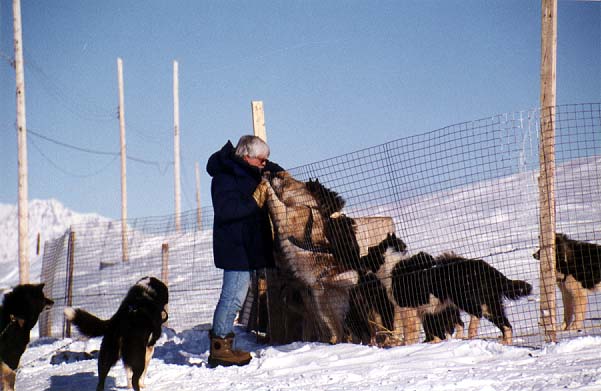Table of Contents
*
Raising Sled Dogs
*
The Good, the Bad and the ‘Eskimo’ Dog
*
The Russian Connection
*
Honoured Symbol Under Fire
*
Iqaluit Team Owner Speaks Out
*
The Homecoming
*
Niels Pedersen, D.V.M:
Challenging Folk Remedies
*
Janice Howls:
Maintaining the ISD Roots
*
Book Review:
Portrait of Antarctica
*
First Hand Account:
Exploration of Antarctica
*
IMHO:
Dog Ownership in Modern Society
*
Baking: Carnivore Brownies
*
Behaviour Notebook:
Silent and Induced Heat
*
ISDI Summit Postponed
*
Memorable Inuit Dog Encounters
Navigating This
Site
Index of articles by subject
Index
of back issues by volume number
Search The
Fan Hitch
Articles
to download and print
Ordering
Ken MacRury's Thesis
Our
comprehensive list of resources
Talk
to The Fan
Hitch
The Fan Hitch
home page
ISDI
home page
Editor: Sue Hamilton
Webmaster: Mark Hamilton
Contents of The Fan Hitch Website and its publications are protected by international copyright laws. No photo, drawing or text may be reproduced in any form without written consent. Webmasters please note: written consent is necessary before linking this site to yours! Please forward requests to Sue Hamilton, 55 Town Line Rd., Harwinton, Connecticut 06791, USA or mail@thefanhitch.org

Visiting witha Pond Inlet team Hamilton photo
In My Humble Opinion:
Dog Ownership in a Modern Society
by Mark Hamilton
These days someone could easily get the impression that there are very few people around who actually like dogs. It is increasingly common for people with more than a dog or two to find themselves running afoul of existing or proposed ordinances restricting the number of dogs they are allowed to keep. Some locations go further still, seeking to restrict even the breeds of dogs that their residents are permitted to own.
Viewed in that light, you too may now be questioning the actual size of the pro-dog constituency. But many people do like dogs. We all know that. In the United States dogs are second only to cats in popularity, and the shift to the number two position is a relatively new occurrence. The human/canine bond goes back to our earliest history. The development of our species, as well as the dog, depended upon interaction and cooperation with the other. So to what do we attribute the increasing hostility toward dogs, and just how broad based is that hostility?
As far as I've seen, these ordinances and restrictions are all being generated by local governing bodies. When I've had the opportunity to question representatives of those governments, and in the news articles I've read reporting on still more of these situations, impetus for regulation is usually placed on the need to respond to existing problems: between a dog owner and the local government, between a dog owner and neighbors, or both. Regulations written all universally ban or restrict a breed or activity as a substitute for addressing the specific problem with any given person or dog.
In an effort to try to understand the position of local government officials, I've imagined myself in their shoes. For instance, suppose a five year old on his/her swing set is bitten by a neighbor's dog. What do I do? Or what if I get a half a dozen phone calls and a couple of letters from residents in the town's newest condominium complex complaining about barking dogs on an adjacent property. Now what action do I take? Have you noticed there was no initial consideration as to whether or not I should act, or am required by law to act, only what action I should take? This is the seductive side to governance, "I'm in charge, I should do something".
Experience teaches us that it is impossible to legislate morality, but many municipalities doggedly continue to try as new laws proliferate. By definition, only the law-abiding voluntarily obey laws. In the case of dog owners, the law-abiding are those who most likely are behaving responsibly in the first place. This leaves the irresponsible wholly unaffected and only the law abiding with their liberty restricted. Douglas Adams, in his five part trilogy "The Hitch Hiker's Guide to the Galaxy" made the point that anyone who wants to be in charge can not be trusted to be in charge. While I don't subscribe to conspiracy theories and am not an anarchist, I fear that could apply in some of these cases.
Dog owners can never be fully aware of all the personal agenda of local officials or their neighbors. Written town plans seldom cover the level of detail that dog ownership represents. We are unlikely to know which, if any, town officials are members of animal rights groups, for example, but we do know that many animal rights groups target dog sledding and dog sledding events. We cannot know how many residents in our towns belong to animal rights groups or the degree to which their personal agenda influence local officials. The thing is, only when we have this kind of information can we assess whether restrictions of our liberties are truly "unintended" consequence of their regulations.
It's enough to make you want to cry, or move to a less
populated area. But when you look around you'll find
there's no place left to hide. "Dog issues" have erupted
even in arctic Canada, which may leave crying the only
viable alternative. Maybe we need to find just the right
ear in which to cry. Or maybe each and everyone one of us
needs to get active in our local communities. Be
pro-active about the restriction of our rights. If we
don't work in our own best interest, we have no reason to
expect others in our "modern society" to respect our
interests.